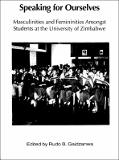| dc.contributor.author | Somerai, Precious | |
| dc.coverage.spatial | Zimbabwe. | en |
| dc.date.accessioned | 2016-03-09T12:55:52Z | |
| dc.date.available | 2016-03-09T12:55:52Z | |
| dc.date.issued | 2001 | |
| dc.identifier.citation | Somerai, P. (2001) Femininity, gender equity, democracy and human rights in higher education: non-resident female students at the University of Zimbabwe. In: Gaidzanwa, R.B. (ed.) Speaking for ourself: masculinities and femininities amongst students at the University of Zimbabwe, Harare: UZ Publications, pp. 77-93. | en |
| dc.identifier.isbn | 0-7974-2385-0 | |
| dc.identifier.uri | https://opendocs.ids.ac.uk/opendocs/handle/20.500.12413/9950 | |
| dc.description | A research paper on gender equity and human rights for non-resident female students at the University of Zimbabwe. | en |
| dc.description.abstract | Generally, institutions of higher learning in Africa have been perceived as repositories of democracy and human rights. These institutions have been regarded as centres of friendly, interpersonal socialisation, career training, liberal thought and athletic achievement where the pursuit of truth and the exercise of reason prevail.
This chapter focuses on off-campus female students studying at the University of Zimbabwe. This group of students constitutes approximately 21% of the total student body. Mazini (1994) in Dwarf (1997:4) points out that academic freedom in Africa has had to confront three levels of constraints, which are global, national and campuswide. This chapter is directed towards understanding the impact of these constraints on the off-campus female student, the meaning she attaches to such an environment and a critical analysis of her response .How this affects the teaching and learning environment is also another major area that will be analysed in this chapter.
Global constraints such as the AIDS pandemic, the introduction of the controversial Economic Structural Adjustment Programme, the massification of enrolment at the University of Zimbabwe, are the pertinent issues, which have been analysed in relation to equity, and democracy issues on campus. | en |
| dc.description.sponsorship | The Ford Foundation. | en |
| dc.language.iso | en | en |
| dc.publisher | University of Zimbabwe Affirmative Action Project (UZAAP) | en |
| dc.rights.uri | http://creativecommons.org/licenses/by-nc-nd/3.0/ | en |
| dc.subject | Children and Youth | en |
| dc.subject | Gender | en |
| dc.subject | Rights | en |
| dc.title | Femininity, gender equity, democracy and human rights in higher education: non-resident female students at the University of Zimbabwe | en |
| dc.type | Book chapter | en |
| dc.rights.holder | University of Zimbabwe (UZ) | en |


